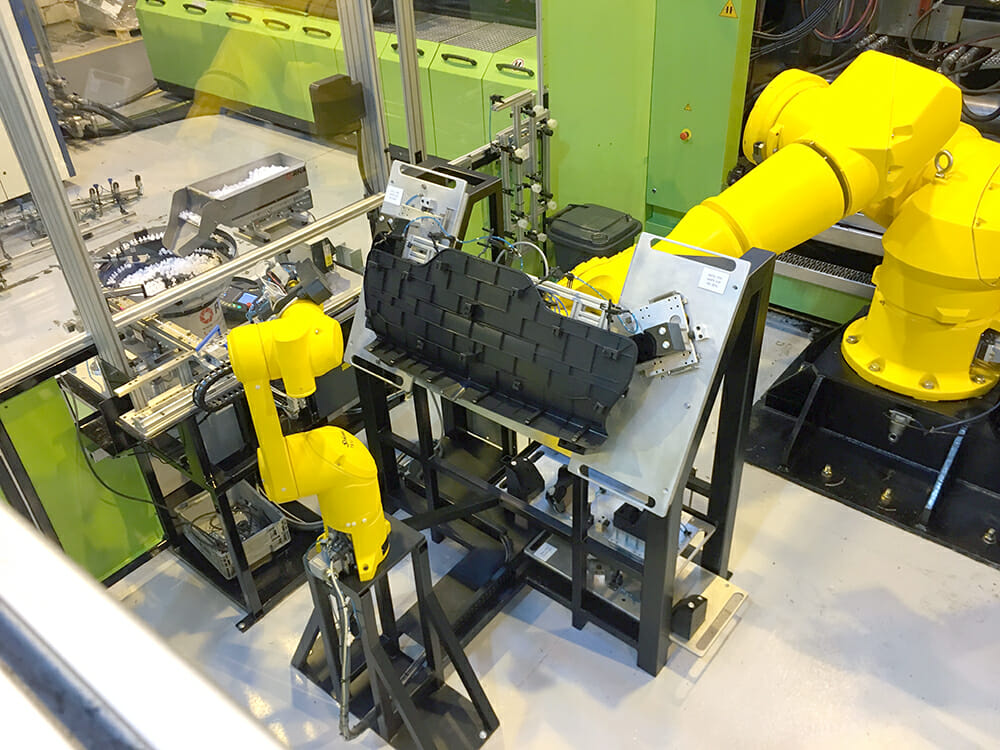Midlands based WHS Plastics is recognised as a valued supplier, operating within a highly competitive global marketplace. The company operates across 3 sites and has 1,000 employees supporting major international companies, in a variety of industries including automotive, electronics, industrial and hygiene products. The cutting edge injection moulding technology at the heart of the business enables WHS Plastics to deliver measurable benefits to their customers, and remain one step ahead of the competition.
In addition to its state of the art injection moulding technology, the company has also invested heavily in robotics and automation to support the moulding process. A large suite of Stäubli 6 axis robots perform a diverse range of tasks ranging from insert loading prior to moulding, to sophisticated post moulding handling and assembly operations, such as the assembly of trim clips to a tailgate moulding described here.
The volume associated with the production of automotive parts means that there will undoubtedly be many repetitive tasks, as each component or sub assembly progresses to its final stage. In the case of injection moulded parts, and especially where additional process or assembly tasks may be required, 6 axis articulated robots have clearly demonstrated their ability to add value by performing a series of often complex post moulding operations directly at the mould press. Such has been the success of this concept for WHS Plastics, that robots are now routinely ordered as part of a package with every new injection-moulding machine.
Further benefits from the use of robots are that they can also alleviate the problems sometimes encountered by manual operators, where the highly repetitive nature of the operation may ultimately cause physical strain, or be at the root of unintended errors. In addition, robots make it possible for operators to acquire new skills, such as managing the automated cell and perhaps performing quality control functions.
Manufacturing and supplying into automotive OEM’s requires the highest levels of quality and consistency, and this can only be achieved through the use of technology that is in itself robust, and capable of meeting the rigorous demands of this sector. Stäubli robots have a long established and enviable reputation for their speed, performance and reliability, attributes that were a key part in their selection by WHS Plastics for integration within their production facility.


The use of a six-axis robot, or in the case of this application, a pair of six axis robots, makes it possible to perform tasks which were traditionally either manually completed at the machine, or carried out within a separate workstation away from the moulding cell. In either case, the introduction of the robots at the moulding cell delivers significant benefits as all handling, post moulding and transfer operations are performed within the mould cycle without the need for any manual intervention. Further benefits include the fact that in process checks can be carried out during the post moulding operations, enabling a “no fault forward” approach to the process.
This production cell uses a Stäubli TX200 six-axis robot to remove a rear tailgate component from the injection-moulding machine. The robot then moves the part to an assembly fixture, where the component, whilst still retained by the gripper, is located and datumed for a clip assembly process. Trim clip components are presented from a bulk hopper and vibratory bowl feeding system situated within the cell. Each part is accurately located at an escapement before being collected by a second Stäubli six axis robot, in this case a TX60 model. The robot then proceeds to position and assemble multiple trim clips to the moulding.






